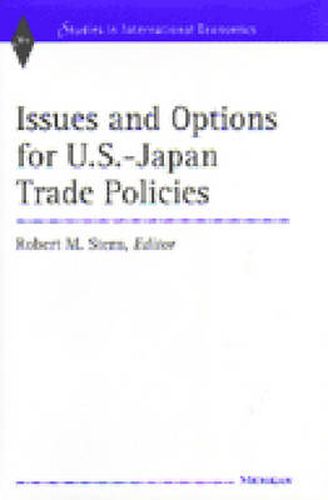Readings Newsletter
Become a Readings Member to make your shopping experience even easier.
Sign in or sign up for free!
You’re not far away from qualifying for FREE standard shipping within Australia
You’ve qualified for FREE standard shipping within Australia
The cart is loading…






Because of the close links between the United States and Japan in trade, foreign direct investment, financial flows, exchange rates, international prices, and government policies, it is important to develop a better understanding of these links and how they may be turned to the advantage of all involved by improvements in the international policy environment. This book deals with the potential for such improvements as part of formal government-to-government negotiations in the multilateral context in the World Trade Organization (WTO), regionally in the Asia-Pacific Economic Cooperation (APEC) forum, and bilaterally with the administration of national trade laws and the negotiation of free trade agreements. The chapters represent a spectrum of approaches, including theoretical analysis, quantitative measurement, and evaluations of policies and institutions from economic and legal perspectives. The multi-lateral issues cover the analysis of the economic effects of a new WTO negotiating round and the range of issues that are to be addressed there, including reform of Japan’s agricultural policies, services liberalization, antidumping, intellectual property rights, and trade and the environment. The regional issues include theoretical and simulation analysis of the benefits of preferential trading arrangements and the policy of open regionalism that is being sought by APEC members. U.S.-Japan bilateral relations are studied by analyzing the major actions and positions taken by the two nations in the context of their national trade laws and policies, how trade policies are implemented, the effects of bilateral trade agreements on the United States and Japan, and the interplay of legal decisions reached in WTO actions with bilateral and unilateral measures undertaken by the two nations. The book is designed for a broad audience consisting of academic economists, lawyers, policymakers, and students interested in U.S.-Japan international economic relations. Robert M. Stern is Professor Emeritus of Economics and Public Policy, University of Michigan.
$9.00 standard shipping within Australia
FREE standard shipping within Australia for orders over $100.00
Express & International shipping calculated at checkout
Because of the close links between the United States and Japan in trade, foreign direct investment, financial flows, exchange rates, international prices, and government policies, it is important to develop a better understanding of these links and how they may be turned to the advantage of all involved by improvements in the international policy environment. This book deals with the potential for such improvements as part of formal government-to-government negotiations in the multilateral context in the World Trade Organization (WTO), regionally in the Asia-Pacific Economic Cooperation (APEC) forum, and bilaterally with the administration of national trade laws and the negotiation of free trade agreements. The chapters represent a spectrum of approaches, including theoretical analysis, quantitative measurement, and evaluations of policies and institutions from economic and legal perspectives. The multi-lateral issues cover the analysis of the economic effects of a new WTO negotiating round and the range of issues that are to be addressed there, including reform of Japan’s agricultural policies, services liberalization, antidumping, intellectual property rights, and trade and the environment. The regional issues include theoretical and simulation analysis of the benefits of preferential trading arrangements and the policy of open regionalism that is being sought by APEC members. U.S.-Japan bilateral relations are studied by analyzing the major actions and positions taken by the two nations in the context of their national trade laws and policies, how trade policies are implemented, the effects of bilateral trade agreements on the United States and Japan, and the interplay of legal decisions reached in WTO actions with bilateral and unilateral measures undertaken by the two nations. The book is designed for a broad audience consisting of academic economists, lawyers, policymakers, and students interested in U.S.-Japan international economic relations. Robert M. Stern is Professor Emeritus of Economics and Public Policy, University of Michigan.